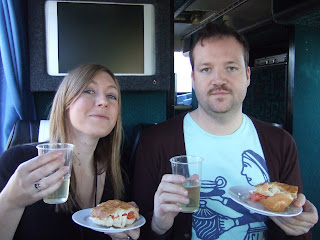
I think it’s a nerdy drummer thing, but I love jazz waltzes. For me they’re evidence that our appetite for musical complexity is way more sophisticated then we think it is, that music doesn’t have to be childishly simple to be approachable. One way of looking at the jazz waltz is that it is dance music in 9, a meter so odd that it probably lives in a tumbledown house on the edge of music town, and gets pelted with rotten fruit by the rude little marches and polkas when it goes out walking with its mate, the slip jig. I’d been thinking for a while that I’d love to arrange a brash, jazzy, waltz version of a traditional song, using some influences from my favorites – Van Morrison’s The Way Young Lovers Do, Charles Mingus’s Better Git It in Your Soul, Calexico’s – Over Your Shouder (strictly neither jazz nor a waltz, but a relative of sorts from an imaginary Mexican border town) and Dollar Brand’s Blues for a Hip King. I was still smarting from my mum’s pronouncement over the songs I had arranged for our previous album, Matachin – “they’re ok, but you’re not much good at writing a catchy tune, are you?”, and I wanted to come up with a proper old-fashioned earworm. The big problem was, which traditional song to choose?
In many respects, Cold Blows the Wind, aka The Unquiet Grave, was a strange choice. For most people it’s a sad song – one of the bleakest moments in a tradition which takes pride in its preponderance of bleak moments. But coincidentally, I was at the time re-reading Alejo Carpentier’s The Lost Steps – a great, great book in which there is a beautiful and persuasive account of ritual mourning as an ecstatic experience – a wild ecstasy which is neither wholly happy nor sad, but contains elements of both emotions. In my mind's eye the protagonist of Cold Blows was instantly changed from a boring, drippy waif, to the kind of girl Captain Beefheart talks about in Long Necked Bottles – “One night she got to drinking, got out and shot up the town – I’ll be damned she didn’t bring an airplane down”. On another completely different tangent, I was having a go with my rudimentary spanish at translating some J.G. Posada broadsides, as you do, and the incredible prints of happy dancing skeletons found their way into the music too.
Of course, for the kind of treatment that all these influences demanded I needed a new melody, as well as some kind of rousing instrumental tag. I found the first by cannibalising the Canadian version of The Dewy Dells of Yarrow, and the second came to me while I was washing up. Jon's falsetto moment was yet another piece of applied plagiarism stemming from a adolescence spent listening to way too much of The Smiths and The Associates - I didn't fancy my chances selling it to him, but he turned out to be very amenable to the idea (which argues well for him waving large bunches of gladioli around onstage next tour!).
Of course, for the kind of treatment that all these influences demanded I needed a new melody, as well as some kind of rousing instrumental tag. I found the first by cannibalising the Canadian version of The Dewy Dells of Yarrow, and the second came to me while I was washing up. Jon's falsetto moment was yet another piece of applied plagiarism stemming from a adolescence spent listening to way too much of The Smiths and The Associates - I didn't fancy my chances selling it to him, but he turned out to be very amenable to the idea (which argues well for him waving large bunches of gladioli around onstage next tour!).
By the time we got to Abbey Road to record Hedonism with the mighty John Leckie at the controls, we’d been playing Cold Blows for over a year in our live sets. We’d suffered the indignity of being derided by American fans of the band Ween for doing a cover of “their” song. We’d even had a few of our own fans question whether we had the maturity to tackle such a old and hallowed text (they have a valid point). Meanwhile we’d been working harder than we ever had previously in the rehearsal process – picking tunes apart, asking the right questions (do you really need three counter melodies in verse two? What does “random burbling, all registers” mean as a performance indication?), then reassembling it without losing track of the original vision. I think we were all clear, without it necessarily having been articulated, that if Matachin was the album where we let it all hang out for better or worse, this new one needed to be more focused, streamlined and disciplined. And it was all working so well until someone let Jon bring his musical saw into the studio…..


















 ...and it was all too much for some people!
...and it was all too much for some people!








